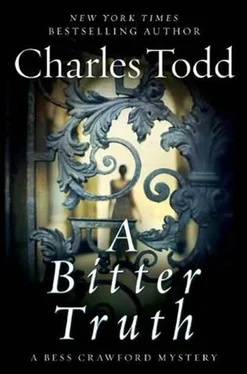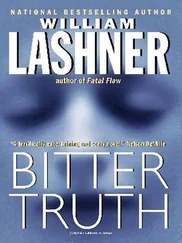She stopped in the passage and regarded me for a moment. “What could I say, that wouldn’t be a reflection on Roger? You don’t know Dr. Tilton.”
“Tell him you slipped on the stairs. It’s true.”
“Will you go with me?”
“Of course.”
“Then tomorrow. Before your train leaves.”
With that out of the way, Lydia seemed to be as relieved as I was. We went first to my room, and on the landing I could see for myself the sharp edge of the square mahogany newel post. The cut in her scalp was proof enough of how hard she’d struck it. Hard enough indeed for a concussion.
A fire had been lit on the hearth, taking away the damp chill of the day, and the drapes had been drawn against the rain. I went to the window anyway, and pulling them aside, looked out. The knot garden lay spread out below, an intricate design of boxwoods and flower beds that seemed at odds with a house on the edge of a heath. Around the garden were planted tall evergreens as a shield against the wind and also, I thought, to shut out the landscape beyond.
“It’s my favorite view,” Lydia said, coming to stand beside me. “And in high summer, it’s beautiful. It was put in for Gran, you know. A wedding gift from her husband, Roger’s grandfather. Her room overlooks it too.” We returned to the hall by the main stairs, and Lydia said, “Everything starts here. Those stairs along the wall lead up to the oriel window above. You saw it as we came up the drive. The formal rooms are in the right wing, and the family rooms are in the left. Go through the door-the one over there, that we used when we first arrived-and turn to your right in the passage and you come to the drawing room. Well, we call it that, although it’s not all that splendid these days. After we were married, Roger’s mother told me I could redecorate it to suit my tastes, which was very kind of her. Before I could really set about it, the war began.” We were walking through the door and following the passage now. “That door is the dining room, this one the drawing room, and beyond it is a small library. Across from the library is Roger’s grandfather’s study. Gran uses it sometimes, when she isn’t in the mood to sit with the family.” We retraced our steps, and she opened the door into the formal dining room. It was elegant in dark green upholstery that set off the well-polished wood, and the tall, handsome sideboard. Long dark green velvet drapes trimmed in cream framed the double windows. The carpet was a paler green and cream in a floral pattern.
Lydia pointed to the fox mask carved above the sideboard. The chairs at the head and foot of the table had smaller versions at the ends of the arms. “The house is said to have been built originally over a vixen’s den. That’s where the name comes from. But one story has it that Roger’s ancestor used the lodge for assignations, and when his wife found out, she killed him and blamed his death on a rabid fox.”
“How charming,” I said with a smile.
“Yes, I felt the same when I first came here. Sadly, the room is used very seldom now. With just the three of us, Gran and Mama Ellis and me, we usually take our meals in the sitting room.”
I could see why. The table would seat twenty comfortably, and with only one hearth, it must be very cold in winter. I noticed the paintings hanging on the walls, mostly landscapes from Italy and Switzerland and by a very accomplished hand.
“Gran painted them. On her honeymoon. Roger’s grandfather had them framed and hung as a surprise for her after their first child-Matthew, Roger’s father-was born.”
She closed that door and turned to the one across the passage, opening it into the drawing room. It faced the drive, and even on such a dreary afternoon, it was well lit and very pleasant. Stepping inside, the first thing that drew my eyes was the lovely hearth of Portland stone-and above it the most astonishing portrait.
The child was beautiful, fair haired and sweet faced, with an impish gleam in her blue eyes, and she had been captured in an informal pose, glancing toward the artist over one shoulder, her smile so touching I stood there in amazement.
“That’s Juliana,” Lydia was saying in a flat voice.
“How sad!” I replied, meaning it. I couldn’t take my eyes from the painting. Juliana appeared to be on the verge of laughter, and I almost held my breath listening for it. If the living child was anything like this portrayal in oils, I could understand why her memory was so vivid in the minds of her grieving family.
“We use this room only when we have guests. I suggested once to Roger that we move the portrait. And he was furious. He said she belonged here, in a tone of voice that told me I didn’t. It was our first quarrel.”
As she closed the drawing room door, she went on, “He worshipped her, you know. Roger. He took her death so hard that he didn’t speak for months. They feared for his sanity, Gran said. Margaret and Alan were older, they understood death a little better, although that didn’t make hers easier for them.”
I thought about what it would have been like, watching helplessly as the little girl slowly weakened and died.
We walked back to the great hall, and Lydia pointed to one of the chairs in front of the fire. “Let’s sit here for a bit, shall we? Before dressing for dinner.”
What she meant was, she wasn’t ready to face Roger alone in their bedroom.
We sat down, feeling the draft at our backs as the rain beat against the door and the walls. It sounded like distant drums or even muted gunfire.
“What am I to do, Bess?” she said at last, staring into the heart of the fire. “I love Roger. In spite of this. How long will this war go on? What if he’s killed-or horribly wounded? What if he’s like George, bitter and hurtful, and I can’t bear to have him touch me?”
“Yours isn’t the only family asking these questions tonight,” I replied after a moment. “Love isn’t a certainty, Lydia.”
But she shook her head. “You aren’t married. You don’t know what it’s like to love someone and want to have a part of them for your very own.”
It occurred to me that one of the reasons Lydia was so insistent on children was that she had lived these past three years with two widowed women. She could already see what the future held if Roger was killed. In India some wives preferred to throw themselves on the funeral pyre and be immolated with their husbands. Sometimes it was true grief-sometimes it was knowing what a bleak empty life lay ahead of them, especially if they were dependent on the charity of a family that didn’t want them. Death was sometimes preferable to living. The British had done their best to outlaw suttee, but it hadn’t been completely abolished.
I said gently, “Then I’m the wrong person to ask.”
Sighing, she said, “Well. Roger’s leave will be up soon enough. I have until then to change his mind. Somehow.”
I looked across at her bruised face. If Juliana died of a mastoid tumor, it was no one’s fault. Unlike some tragic accident where guilt couldn’t be avoided. Why had her death affected her brother so deeply? Was it the shock of loss, unacceptable to a child’s mind? Had Margaret and Alan also been haunted by their little sister’s death? They too were childless.
“You said you shouldn’t have mentioned Juliana when you quarreled. Did you blame her for your husband’s refusal to have children?”
“Yes, I told him he was afraid he’d lose a child, the way his family had lost Juliana, and it was time now to let her rest in peace and begin to live in the present.”
We sat there in silence for a time, and then Lydia reluctantly got to her feet. “It’s nearly time for dinner. I’m glad you came, Bess,” she said. “It was terribly kind of you-”
Читать дальше












